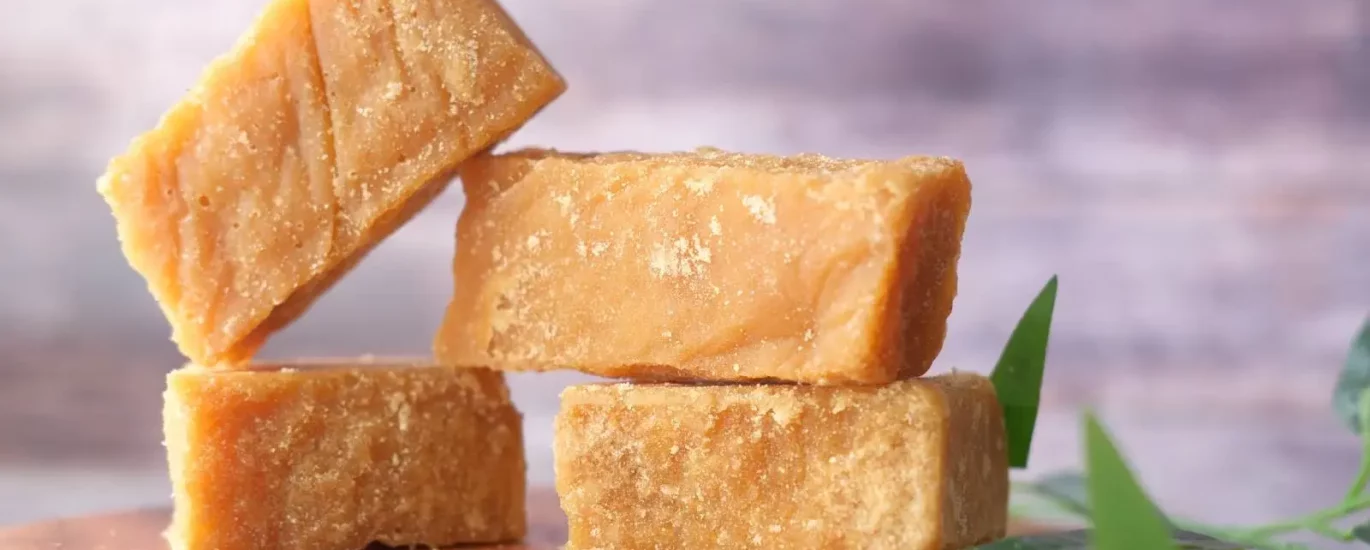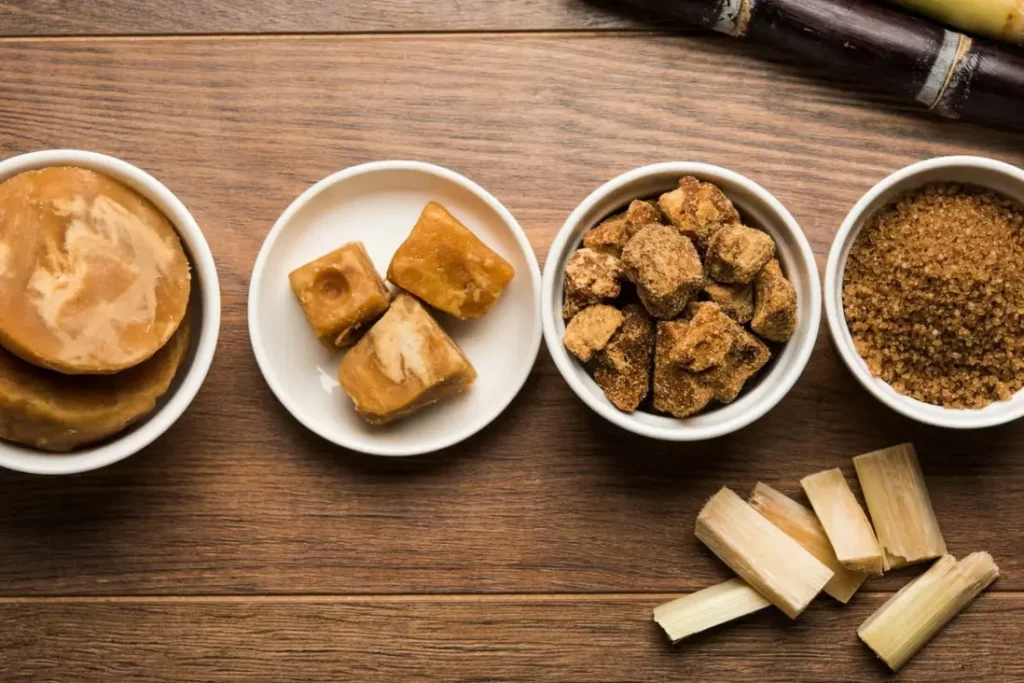

wordpress-seo domain was triggered too early. This is usually an indicator for some code in the plugin or theme running too early. Translations should be loaded at the init action or later. Please see Debugging in WordPress for more information. (This message was added in version 6.7.0.) in /home/sehatnagar.com/public_html/wp-includes/functions.php on line 6114
Jaggery, a traditional sweetener widely used in various cuisines, has gained attention in recent years for its potential benefits in weight loss. This unrefined sugar, derived from sugarcane or palm sap, offers a healthier alternative to refined sugar due to its higher nutrient content and lower glycemic index. Now, many people think that “Is Jaggery Good for Weight Loss”. So, in this article, we will explore the answer through the properties of jaggery and examine its potential role in supporting weight loss goals.
Jaggery, also known as “gur” or “panela,” is a traditional form of sugar commonly produced in South Asia, Southeast Asia, and some parts of Africa and the Caribbean. It is made by extracting the juice from sugarcane or palm trees, which is then boiled and concentrated until it solidifies into a block or cake-like form.
In addition to its use as a sweetener in various dishes, jaggery is also valued for its potential health benefits. It contains trace amounts of minerals like iron, calcium, phosphorus, and magnesium, as well as some vitamins and antioxidants. Compared to refined sugar, jaggery retains more of these nutrients due to its minimal processing.
Jaggery is widely used in traditional cuisines, particularly in desserts, sweets, and beverages. It is a common ingredient in dishes like halwa, laddu, chikki, payasam, and Jaggery Rice. It is also used to make traditional Ayurvedic medicines and tonics.
The process of making jaggery involves several steps. First, the juice is extracted from crushed sugarcane or palm sap. The extracted juice is then strained to remove any impurities. Next, the juice is simmered in large, shallow pans or cauldrons, allowing the water to evaporate and the liquid to thicken. During this process, the juice is stirred continuously to prevent it from burning.

As the liquid reduces, it transforms into a thick syrup-like consistency. The syrup is then transferred to molds or trays, where it cools and solidifies, forming the characteristic blocks or cakes of jaggery. The final product ranges in color from golden brown to dark brown, depending on the type and processing method used. Jaggery has a distinct flavor profile with notes of molasses and caramel, giving it a rich and earthy taste. Its texture can vary from soft and moist to hard and brittle, depending on the moisture content and processing technique.
As per USDA, one hundred grams of jaggery contains the following nutrients.
While jaggery offers some nutritional benefits, it is important to note its high caloric density. One teaspoon of jaggery contains approximately 20-22 calories, which is similar to the caloric content of refined sugar. Consequently, overconsumption of jaggery can contribute to weight gain rather than weight loss.
Despite its caloric content, jaggery may have certain properties that could potentially support weight loss efforts. It is believed to stimulate the digestive enzymes in the body, thereby aiding metabolism. Additionally, jaggery contains compounds like polyphenols and flavonoids, which have been associated with improved metabolism and fat oxidation.
Jaggery contains a small amount of dietary fiber, which can help promote feelings of fullness and reduce overeating. This may indirectly support weight loss by preventing excessive calorie consumption. However, the fiber content in jaggery is relatively low compared to other fiber-rich foods, such as fruits, vegetables, and whole grains.
One significant factor to consider is the glycemic index (GI) of jaggery. GI measures how quickly a food raises blood sugar levels. Jaggery has a medium to high GI, which means it can cause a rapid spike in blood sugar levels. This can lead to increased insulin secretion, potentially hindering weight loss efforts and contributing to cravings.
While jaggery is a natural and unrefined sweetener that contains some minerals and nutrients, it is not specifically recommended for weight loss. Jaggery is still a source of calories and carbohydrates, so consuming it in excess can contribute to weight gain.
If you are aiming to lose weight, it is generally advisable to limit your overall intake of added sugars, including jaggery. It is important to focus on a balanced diet that includes a variety of whole foods such as fruits, vegetables, lean proteins, whole grains, and healthy fats. Additionally, incorporating regular physical activity and practicing portion control are key components of a successful weight loss plan.
While jaggery may offer some trace nutrients and a lower glycemic index compared to refined sugar, these factors alone are unlikely to significantly impact weight loss efforts. It’s important to remember that weight loss is a result of a calorie deficit, where you consume fewer calories than you burn.
Jaggery is not typically recommended for weight loss due to its high calorie content. While it is a natural sweetener that retains some minerals and nutrients, it is still a source of carbohydrates and calories. Consuming jaggery in excess can contribute to weight gain rather than weight loss. For successful weight loss, it is generally advised to focus on a balanced diet that includes nutrient-dense foods and to control overall calorie intake. It’s important to consult with a registered dietitian or healthcare professional for personalized advice on weight loss strategies.
Jaggery is an excellent substitute for refined sugar. One can sweeten milk, tea, coffee, and other drinks. One can add jaggery to many recipes to give them a distinctively sweet flavour. In addition to adding sweetness, it also offers several nutrients. However, it is still crucial to remember that it contains calories. Therefore, excessive consumption of jaggery as a sugar replacement is still unhealthy.
Nuts and jaggery go well together as a food pairing. Jaggery can be added to roasted nuts like cashews, almonds, or peanuts to create a tasty and nutritious snack. Peanuts with jaggery coating or chana are popular on-the-go food items that leave you perked up.
Jaggery is famous for its sweetness and dietary advantages. However, there are specific health concerns to be aware of. The first thing to remember is to watch how much you eat because jaggery still has a lot of calories and carbs. For people with diabetes, excessive consumption may result in weight gain or high blood sugar levels.
Additionally, buying jaggery from trustworthy vendors is vital to guarantee its quality and purity. Jaggery that has been contaminated or altered may be unhealthy.
Jaggery that has been contaminated or altered may be unhealthy. Not everyone should consume jaggery, particularly those with certain medical conditions or dietary prohibitions. Before introducing jaggery to your diet, speaking with your doctor or dietician is essential.
Can You Drink Milk During Intermittent Fasting?
Is Pomegranate Good For Weight Loss?
Rapid Weight Loss Diet Plan: How To Lose 5kg In 5 Days
A: Jaggery is a form of unprocessed sugar which goes by the name ‘Gur’. It is typically created by boiling raw, concentrated sugarcane juice until it solidifies. It can also be manufactured from coconut or date palm sap.
A: Jaggery can aid in weight loss when included in a healthy, balanced diet and consumed in moderation. Compared to refined sugar, it is a natural sweetener with fewer calories and a lower glycemic index, which helps control blood sugar levels and prevents unexpected insulin spikes. Jaggery is also abundant in vital nutrients that help enhance energy levels and support general health when trying to lose weight.
A: Due to its comparatively low-calorie content, lower glycemic index when compared to refined sugar, and the availability of vital elements that support overall health, jaggery can help people lose weight. It can be a natural substitute for processed sugars, helping regulate blood sugar levels, minimising unexpected insulin spikes, and helping people manage their weight.
A: Jaggery’s low calories, low glycemic index, and high nutritional value make it a healthier alternative to sugar when trying to lose weight. However, one should always consume it in moderation. Excess consumption can lead to adverse effects on your weight loss process.
A: People have different limitations regarding the amount of jaggery to consume. It depends on their age, degree of activity, and daily calorie intake. To avoid consuming too many calories and to aid in weight loss, one should always consume jaggery in moderation, keeping daily intake to a teaspoon or less.
A: Jaggery is typically harmless when used in moderation for weight loss. Yet, excessive consumption may result in weight gain due to its high-calorie content. In addition, people living with diabetes should keep an eye on their blood sugar levels because jaggery can raise or lower them.
A: While jaggery can be a healthier alternative to refined sugar, it alone is not proven to reduce belly fat specifically. Weight loss results from a balanced diet, regular exercise, and a healthy lifestyle. Including jaggery in moderation as part of an overall healthy eating plan may support weight loss efforts, but the targeted reduction of belly fat requires a comprehensive approach.
A: There is no clear answer to whether jaggery or honey is better for weight loss, as both contain calories and should be consumed in moderation as part of a healthy diet. However, jaggery is better than refined sugar as it contains some nutrients and has a lower glycemic index.
A: Since jaggery contains natural sugar, those with diabetes should exercise caution while consuming it for weight loss because it may impact blood glucose levels. One should consult a healthcare professional or a registered nutritionist to assess the acceptability and safe use of jaggery for weight reduction for diabetes management.
A: Some healthy ways to consume jaggery while trying to lose weight include choosing jaggery-based sweets with lower calorie and fat contents, using it as a natural sweetener in beverages, desserts, or snacks in moderation, or combining it with nutrient-dense foods like nuts, seeds, or fruits for a balanced and healthy diet. Effective weight loss with jaggery depends on controlling calorie consumption and portion sizes.